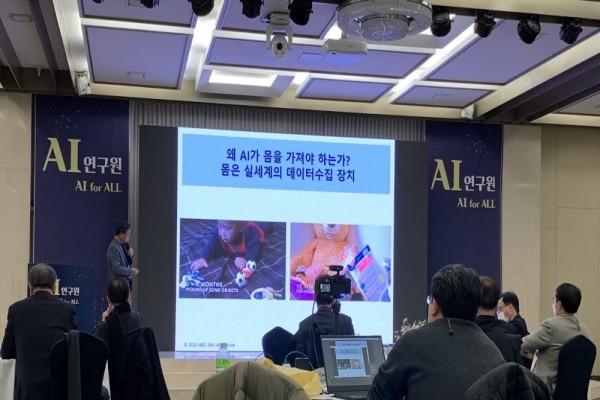“Now is the time for the AI paradigm to leave a closed world and enter an opened world. AI is going through a stage where it can be applied to various industries as it comes out of a virtual world and enters a real world.” said Director Jang Byeong-tak of Artificial Intelligence Institute of Seoul National University during his presentation on “Current State and Forecast on AI Research” at a symposium that was held at the university’s Faculty Club on Tuesday to celebrate one year anniversary of the institute.
The symposium was held to introduce studies that have been carried out by the institute since its establishment in December 4 of 2019 and to predict future and policies on AI. Design of Haedong Advanced Engineering Technology Research Institute, which is expected to be completed with the construction by 2022, was also made public for the first time.
In 2019, Kim Jeong-shik, who is the founder of Daeduck Electronics and passed away in 2019, donated $45.1 million (50 billion KRW) to support the university’s research on AI. Youlchon Foundation also donated scholarships in order to support the university’s AI studies. Ten AI research centers under the university’s AI institute are at the front in development of new medicines to multidisciplinary convergence studies on health and care, financial management, and education.
AI Institute began its studies on AI from limitations of deep learning. “Although AlphaGo is an excellent AI, it is not able to look at the go board or place go pieces.” said Director Jang while pointing out that the current AI only has a brain and does not have a “body” that allows the AI to recognize and learn the world. The institute has been focusing on an issue that AI is able to operate only in a virtual world and is not able to operate or learn properly in the real world.

Director Jang focused on a technology that assists AI to learn through experiences while comparing its learning to a learning process of a child getting to know different knowledge through experiences. “Baby Mind” that was kicked off from a question on whether AI is able to learn about the world just like children is a prime example. Baby Mind requires studies on multiple intelligences such as vision, hearing, and feel. Based on the technology, teaching method for children with disabilities and learning materials and environment for infants can be developed.
In addition, the institute is also conducting a research on “VTT (Video Turing Test)” that allows AI to understand a story from watching a video. Various studies on facial recognition, computer vision, hearing intelligence, and language intelligence are taking place.
The institute has designed its laboratories so that they resemble home environment. Its goal is to have robots such as SoftBank’s Pepper robot experience and learn house chores for 24 hours a day.
“We need to study AI that possesses new recognition ability, perception ability, and ability to act.” said Director Jang. “While the current AI only possesses a “brain”, it will not be long before robots are equipped with a brain and a body.”
“Since the establishment of the institute, there has been development of new innovations as AI is applied to various fields that seemed not to have any relation with AI.” said Noh Dong-young who is the chairman of Seoul National University’s AI committee. “We were able to attract professors who were interested in AI but did not have opportunities to participate to convergence research and we expect that the institute will be a place for everyone to research AI.”
Choi Yang-hee, who was the first chairman of the committee made a request to the university about solving difficulties for companies through industrial-educational cooperation and playing a leading role in AI research when it comes to different systems, laws, and ethics.
Staff Reporter Kim, Myunghee | noprint@etnews.com